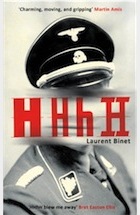 Another Broadway Book Club choice, HHhH I can only describe as
uniquely annoying. I can't even decide what my overall feelings about it were,
they swung from admiration to hatred so frequently.
Another Broadway Book Club choice, HHhH I can only describe as
uniquely annoying. I can't even decide what my overall feelings about it were,
they swung from admiration to hatred so frequently.HHhH (eventually) tells the story of Operation Anthropoid, a daring assassination attempt on the life of super-Nazi extraordinaire Reinhard Heydrich in Prague during World War II. The part that has a narrative follows the history of Operation Anthropoid, picking up a few historical strand from elsewhere as it rolls along, and looks at the lives, histories and circumstances of heroic parachutists and would be assassins Jozef Gabčík and Jan Kubis. Binet is also careful to pay proper tribute to all the Czech and Slovak civilians that risked their own necks and the necks of their families in the name of resistance and paid the price.
I felt like I learned a lot from this book- did I ever mention how bad my history was? I didn't know Russia was even *in* WW2 until I played Call of Duty: World at War. Not my strong suit. The diplomatic and social history of the now non-existent Czechoslovakia is really interesting, as is the history and the career of one of the only men who can claim to be more evil than Hitler. Apparently it was Heydrich that masterminded and executed "The Final Solution" towards the end of the War. His several nicknames (The Blond Beast, The Hangman, The Butcher of Prague) don't really do justice to the absolute walking ball of evil that was Heydrich.
But what of the annoyance? Well. Throughout the entire novel, Binet bemoans the fact that all historical novels are riddled with painful inaccuracies, speculation and embellishment. And so they may be. But it's not of particular importance to the people that read them. Binet seems torn throughout- he is obviously an indisputable expert, borderline obsessive about the story of this particular mission. Should he have just written a factual book about Operation Anthropoid? I think he should have...I think he would have been happier with that, maybe he would have felt that he was doing a greater service to his heroes.
HHhH is insanely thoroughly researched, you have to give him that. But to constantly berate the concept of fiction, to make your hatred of literature (both with and without a capital L) known repeatedly throughout- I think, just antagonises the reader. I like fiction. That's why I'm reading whatever this book is. A non-fiction novel? I dunno. Just don't make out that your story, or your information, or whatever it is is too noble, too worthy or just far too important to stoop to the murky depths of fiction.
Half of the book is the story of the assassination mission. This is very good- expertly told, informative, full of heroism and suspense. 25% is Binet moaning about fiction, the inaccuracy, the embellishment, the speculation, the unworthy authors that have smeared his precious fact. 25% is a biography of the book. It's like Binet is a character in a book who's currently writing a book about Heydrich's assassination. He talks about his trips to Prague, to museums, to cafes. He talks about his girlfriend, his friends, his father.
It's unique, it's unusual. Binet's obviously a gifted storyteller, which is what makes his attacks on the concept of fiction so annoying. Is he being ironic? Is he saying that nobody can ever know for sure what happened in the annals of history, but he knows more than most, and though he hates embellishment he's going to embellish anyway and then moan about it and we'll never know where the history ends and the fiction begins? I honestly can't tell if I liked it or not, but it was certainly interesting.

No comments:
Post a Comment